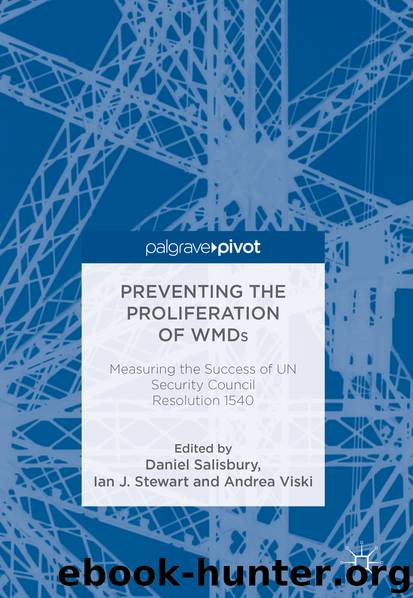Preventing the Proliferation of WMDs by Daniel Salisbury Ian J. Stewart & Andrea Viski

Author:Daniel Salisbury, Ian J. Stewart & Andrea Viski
Language: eng
Format: epub
Publisher: Springer International Publishing, Cham
Latin America and the Caribbean Group
Latin America and the Caribbean is a diverse region ranging from large states with economies of global importance to small island states home to less than 100,000 people. The region is host to two principal countries with nuclear technology—notably Argentina and Brazil—who sought to develop nuclear weapons before rescinding their programmes in the 1980s and 1990s.60 WMD proliferation risks in this region should also be considered in the context of several other security challenges, including the illegal trade in narcotics, small arms, terrorism and serious organised and violent crime.
Like other groupings of developing countries, the Latin American and the Caribbean group was initially sceptical of multilateral export controls regimes. The countries, especially those boasting smaller populations and economies, felt that WMD proliferation was an alien concept and non-existent priority.61 However, this group of countries eventually realised the relevance of controlling WMD technology.
The region has many relevant regional organisations that have been working on 1540-related issues. CARICOM and the Organisation of American States have both been considered useful forums through which to advance the resolution’s agenda, and significant work has been undertaken in cooperation with national governments and NGOs. CARICOM dedicated an individual to be a full-time ‘regional non-proliferation coordinator’ and to work to ‘address non-proliferation capacity shortfalls’, as well as help national governments with reporting and development of national action plans.62 Cross-cutting benefits of national implementation have been emphasised, including the adoption of 1540-linked legislation that could ‘position these states for investment in sectors that previously would not have been possible’.63
A review of national reports to the 1540 Committee suggests that, after 2008, the momentum towards 1540 implementation picked up among the countries that were previously considered indifferent towards its implementation. In the region, several countries submitted their national reports and many more increased their activities for implementation and submitted further reports.64 In this regard, the views of the countries in the region appear to be evolving with resolution 1540 gradually being considered a positive and necessary step towards furthering international security.65
There are signs of growing commitment amongst countries in the region to the non-proliferation agenda. All the countries in the region have signed the NPT , CWC and BWC. The region is a Nuclear Weapons Free Zone following the entry into force of the Treaty of Tlatelolco.66 Concern following the Argentinian and Brazilian nuclear programmes saw the Agreement between the Republic of Argentina, the Federative Republic of Brazil, the Brazilian-Argentine Agency for Accounting and Control of Nuclear Materials, and the International Atomic Energy Agency for the Application of Safeguards.67 That same year, the Mendoza declaration was also signed by Argentina, Brazil and Chile, and saw the three countries pledge not to adopt, use, develop, produce, acquire, stock, or transfer chemical or biological weapons—although it never entered into force.
Like other groupings of developing countries, the Latin American and the Caribbean region has struggled with the non-proliferation agenda—including the implementation of the resolution. As one commentator has noted regarding the Caribbean, involvement of the international community has been pivotal.
Download
This site does not store any files on its server. We only index and link to content provided by other sites. Please contact the content providers to delete copyright contents if any and email us, we'll remove relevant links or contents immediately.
The Pirates of Somalia by Jay Bahadur(1626)
Political Theology by Carl Schmitt(1577)
The Holocaust: A New History by Laurence Rees(1521)
The Social Animal by David Brooks(1452)
A Practical Guide to International Arbitration in London by Hilary Heilbron(1434)
Restitution by Restitution(1424)
Pirates of Somalia by Jay Bahadur(1382)
Coercing Virtue by Robert H. Bork(1357)
The Nuremberg Interviews by Leon Goldensohn(1304)
Basic International Corporate Taxation by Sebastiano Garufi(1214)
A History Of Thailand by Baker Chris(1190)
International Trade and Business: Law, Policy and Ethics by Gabriël Moens & Peter Gillies(1137)
The Global Commons by Susan J. Buck(1137)
The Sovereignty of Human Rights by Macklem Patrick(1113)
Blood Profits by Vanessa Neumann(1113)
Asian Waters by Humphrey Hawksley(1113)
Spring Fever: The Illusion of Islamic Democracy by McCarthy Andrew C(1102)
The Nuremberg Trials: The Nazis and their Crimes Against Humanity by Roland Paul(1046)
Crimes Against Humanity: Historical Evolution and Contemporary Application by M. Cherif Bassiouni(1028)
